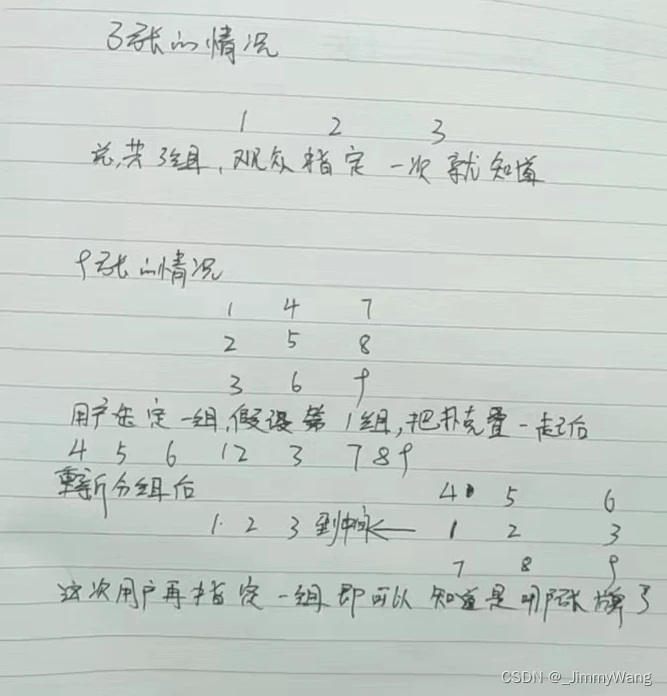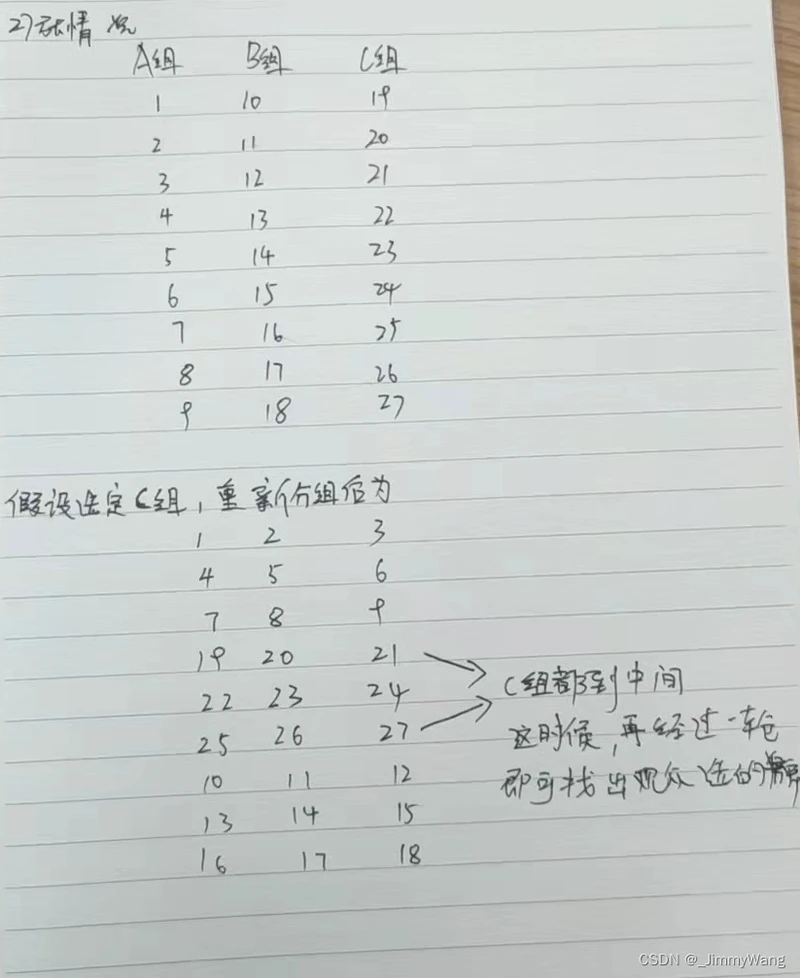代码模拟扑克读心术(21张牌魔术), 关于魔术得数学原理与证明
有这样一个魔术,我相信大家多少都自己玩过或者见别人玩过
魔术流程:
- 随便找出21张纸牌。
- 让观众随便找出一张,并让其他观众看到。(魔术师自己是不看,经过下面的过程我们就会知道那是张什么牌了)
- 把21张牌分成3堆,每堆7张。(让牌背对自己,左到右排三张,从上到下依次按顺序排成三叠)
- 从第一堆牌开始询问观众他所选的牌有没有在里面
- 将有的那一堆放在没有的两堆中间,然后又开始分三堆,询问观众。(如此循环一共三次)这样之后观众的牌就在整叠牌中的第十一张(已经知道答案是第11张了)
6. 展露观众所选的牌了,向观众说:在玩21张牌是,第一张牌是有邪气的,我们一般都不用。将第一张牌放一边。(这里的台词可以自己发挥)
7. 这样整叠牌还剩20张,将所有牌交给观众。告诉观众自己就会把牌找出来。让观众随便说一个10到20中间的任何一个数。比方观众说17
8. 那就让观众将牌一张一张,往桌上发共发17张。让观众把手上剩下的牌放一边
9. 再让观众拿起桌上的牌(刚发的那叠牌),问1+7等于多少。自然是8,那好就再往桌上发8张牌
10. 最后做一个魔术动作,揭开第一张牌就是观众所选的牌了
有一天作者心血来潮,想写代码来证明下模拟下该魔术
接下来是模拟得全部过程
步骤一
初始化54张扑克
const pokers = ["JOKER", "BLACK"]
const nums = ["2", "3", "4", "5", "6", "7", "8", "9", "10", "J", "Q", "K", "A"]
const colors = ["♦", "♣", "♥", "♠"]
for (let index = 0; index < colors.length; index++) {
const color = colors[index];
for (let index = 0; index < nums.length; index++) {
const num = nums[index];
pokers.push(color + num)
}
}
步骤二
进行洗牌
- 洗牌方案1
//每次随机取一张跟最后一张交换
function shuffle(pokers) {
var count = pokers.length; //扑克未交换的牌数
while (count > 0) {
const index = Math.floor(Math.random() * count);
var tmp = pokers[pokers.length - 1];
pokers[pokers.length - 1] = pokers[index];
pokers[index] = tmp
count--
}
}
- 洗牌方案2
//不断抽牌放到一边 产生了新数组
function shuffle2(pokers) {
var res = []
while (pokers.length > 0) {
res.push(pokers.splice(Math.floor(Math.random() * pokers.length), 1)[0])
}
return res
}
两种洗牌方案得区别:方案一不产生新的数组,不断得随机抽取没有洗过得牌放到牌堆得最后一张.方案二是不断随机抽取牌放到一旁,直到所有牌都抽取完毕。在这里,方案一没有产生新得数组,方案二产生了新的数组
步骤三
挑取其中21张(这里其实可以忽略第二部,直接第三步,但是为了模拟更真实的情况,我们还是进行了洗牌操作)
for (let index = 0; index < 21; index++) {
list21.push(pokers.splice[Math.floor(Math.random() * pokers.length)])
}
步骤四
21 张牌进行分组,一张张发牌,从左到右分成三堆
var list7_1 = list21.filter((ele,index)=>index%3==0)
var list7_2 = list21.filter((ele,index)=>index%3==1)
var list7_3 = list21.filter((ele,index)=>index%3==2)
步骤五
模拟观众选牌,并告诉魔术师在哪一堆
var questions = [
{
type: 'input',
name: 'ChooseCard',
message: `选定一张牌,如果在第1组,请输入1","如果在第2组,请输入2","如果在第3组,请输入3\n`
}
]
const answers = await inquirer.prompt(questions)
const group = answers['ChooseCard']
console.log(`选定第${group}组`);
步骤六
三堆牌叠在一起,把观众选定的那一组放在牌中间
list21 = []
if (group == 1) {
list21.push(...list7_2)
list21.push(...list7_1)
list21.push(...list7_3)
} else if (group == 2) {
list21.push(...list7_1)
list21.push(...list7_2)
list21.push(...list7_3)
} else if (group == 3) {
list21.push(...list7_2)
list21.push(...list7_3)
list21.push(...list7_1)
}
步骤七
重复两次步骤四五六,这样牌一定会在21张的最中间
await new Promise(res=>{
setTimeout(res,2000)
})
console.log("经过预测,你选中得牌是:" + list21[10]);
思考与扩展一
我们多次用上述程序模拟,结果是对的,但是人工选牌并输入始终次数有限。我们希望看到成千上万次的结果,所以我们把程序修改为程序自己选牌并且输出结果
//在洗牌并选定21张后,我们让程序随机帮我挑选一张牌
var choosePoker = list21[Math.floor(Math.random()*list21.length) ]
修改步骤五为
var list7_1 = list21.filter((ele,index)=>index%3==0)
var list7_2 = list21.filter((ele,index)=>index%3==1)
var list7_3 = list21.filter((ele,index)=>index%3==2)
const all7List = []
all7List.push(list7_1 )
all7List.push(list7_2)
all7List.push(list7_3)
const group = (all7List.findIndex(list=>{
return list.find(ele=>ele==choosePoker)
})) + 1
console.log(`系统选定第${group}组`);
list21 = []
if (group == 1) {
list21.push(...list7_2)
list21.push(...list7_1)
list21.push(...list7_3)
} else if (group == 2) {
list21.push(...list7_1)
list21.push(...list7_2)
list21.push(...list7_3)
} else if (group == 3) {
list21.push(...list7_2)
list21.push(...list7_3)
list21.push(...list7_1)
}
重复三次步骤四五六,打印系统选中的牌位置
console.log("系统选中的牌所在的位置:"+ list21.findIndex(ele=>ele==choosePoker) );
执行1000次,上面结果都是返回10
思考与扩展二
关于这块的数学原理
在这里,笔者用两张稿纸来绘个图


我们发现其实原理就是不断的指定一组将其放在牌堆中间,继续重排后这一组牌会均匀分布在每一组的中间,比如说我们27张牌,经过用户一次指定就固定在了9张牌内,重排后再分组,用户继续选定就能固定在3张内,在继续重排分组,就能筛出用户选的那一张。
笔者发现
如果分了N组,我们每次分组都能确定出其中的 1/N
总共N组 ,每组M张牌 , 总共扑克数目 COUNT = N*M
总共经过 log(N)M 向上取整+1 次数分组,就可以确定观众选取的牌
我们来简单验证上述公式正确性,假设总共9张 ,我们取下边界值,有如下几个情况
- 3组 每组3个 log(3)3 = 1 => N = 1+1 = 2 (正解)
- 9组 每组1个 log(9)1 = 0 => N = 0+1 = 1 (正解)
- 1组 每个9个 log(1)9 无解 => N = 无解 (正解)
疑问:这里如果是分成两组,是不是有点类似于咱们代码中的二分查找。至少,笔者愿意把这个当成N分查找的变体
思考与扩展三
根据上述公式,我们来扩展一个维度,看看超过21张或者无限多张的情况是怎么样的呢?
话不多说,用代码进行验证
选出牌的个数不一定是21,我们把其提取为一个变量
var choosePokersCount ;
修改步骤三
挑取其中21张改为挑取choosePokersCount 张
for (let index = 0; index < choosePokersCount ; index++) {
choosePokers.push(pokers.splice[Math.floor(Math.random() * pokers.length)])
}
结果打印改为
const result = choosePokers[((choosePokersCount - 1) / 2)] == choosePoker
console.log(`当前选取${choosePokersCount}张,执行结果为${result}` );
我们做下多值测试
for (let index = 0; index < 10; index++) {
choosePokersCount = 9 + 6 * index
if(choosePokersCount>54){
break;
}
await test()
}
打印结果如下
choosePoker:♦5
当前选取9张,执行结果为true
choosePoker:♣J
当前选取15张,执行结果为true
choosePoker:♠A
当前选取21张,执行结果为true
choosePoker:♣4
当前选取27张,执行结果为true
choosePoker:♣6
当前选取33张,执行结果为true
choosePoker:♠A
当前选取39张,执行结果为true
choosePoker:♦5
当前选取45张,执行结果为false
choosePoker:♥Q
当前选取51张,执行结果为false
我们发现打印结果后面不准确,仔细思考,通过公式(总共经过 log(N)M 向上取整+1 次数分组,就可以确定观众选取的牌)发现超过27张扑克需要进行至少四次分组才能确定,我们多进行一次分组,所以我们把重复3次步骤四五六改成4次,再观察结果
choosePoker:♦8
当前选取9张,执行结果为true
choosePoker:♣7
当前选取15张,执行结果为true
choosePoker:♦7
当前选取21张,执行结果为true
choosePoker:♥3
当前选取27张,执行结果为true
choosePoker:♥K
当前选取33张,执行结果为true
choosePoker:♣J
当前选取39张,执行结果为true
choosePoker:♥J
当前选取45张,执行结果为true
choosePoker:♣2
当前选取51张,执行结果为true
果然,发现结果是符合预期的
so…我们进行大胆的广义猜想,给定N组M张牌的情况下依旧成立
问题: 既然分成3组可以经过几次可以选出观众的牌,那么我们再扩展一个维度,超过3组或者无限多组的情况是怎么样的呢?
我们继续修改代码
这次,挑出的牌不一定是3组,每组也不一定7张,我们把其定义为两个变量
var GROUP_COUNT //总共多少组
var GROUP_SUM //一组多少张牌
传统扑克54张,已经不够用了,我们定义一个广义的扑克列表
var nums = []
for (let index = 0; index < 1000; index++) {
nums.push(index)
}
allPokers = []
for (let index = 0; index < colors.length; index++) {
const color = colors[index];
for (let index = 0; index < nums.length; index++) {
const num = nums[index];
allPokers.push(color + num)
}
}
修改步骤三
choosePokers = allPokers.slice(0, GROUP_COUNT * GROUP_SUM)
修改步骤五为
var pokersGroups = []
//分组
for (let indexI = 0; indexI < GROUP_COUNT; indexI++) {
var list = choosePokers.filter((ele, indexJ) => indexJ % GROUP_COUNT == indexI)
pokersGroups.push(list)
}
//计算选定的是哪一叠
const groupIndex = (pokersGroups.findIndex(list => {
return list.find(ele => ele == choosePoker)
}))
//把选定那一叠放到中间
pokersGroups.splice((pokersGroups.length - 1) / 2, 0, pokersGroups.splice(groupIndex, 1)[0]);
choosePokers = []
for (let index = 0; index < pokersGroups.length; index++) {
choosePokers.push(...pokersGroups[index])
}
程序化执行步骤四五六次数
var handlerCount = 0; //统计步骤四五六执行的次数
while (Math.pow(GROUP_COUNT, handlerCount) < GROUP_SUM) {
choosePokers = await fenzu(choosePokers)
handlerCount++;
}
//需要多执行一次
choosePokers = await fenzu(choosePokers)
我们用程序做下多值测试
for (let index = 1; index < 200 ; index++) {
GROUP_COUNT = Math.floor(Math.random()*10)
GROUP_SUM = Math.floor(Math.random()*100)
if( GROUP_COUNT <= 1 ||GROUP_COUNT%2==0||GROUP_SUM%2==0|| GROUP_SUM*GROUP_COUNT > 4000 ){
//GROUP_COUNT GROUP_SUM 必须为奇数 而且求和不能大于扑克总数 GROUP_COUNT要>1
continue
}
console.log("GROUP_COUNT:"+GROUP_COUNT + " GROUP_SUM:"+GROUP_SUM);
await ideal()
}
修改打印结果
const result = choosePokers[((GROUP_COUNT * GROUP_SUM - 1) / 2)] == choosePoker
console.log(`当前分${GROUP_COUNT}组 ,每组分${GROUP_SUM}个 ,执行结果为${result}` );
最终结果打印符合预期
choosePoker:♠446
当前分9组 ,每组分79个 ,执行结果为true
choosePoker:♦101
当前分9组 ,每组分65个 ,执行结果为true
choosePoker:♠98
当前分9组 ,每组分43个 ,执行结果为true
choosePoker:♥932
当前分7组 ,每组分77个 ,执行结果为true
choosePoker:♠495
当前分3组 ,每组分19个 ,执行结果为true
思考与扩展五
问题: 如果是偶数组 ,每组偶数个,怎么办呢?
答案:偶数组也会不断的把观众选到的牌筛选到中间来,但是魔术师无法知道具体是哪一组,因为偶数组没有最中间的那一组之说,只能定位到中间的那两组。同理,每组偶数个也是一样的,多次筛选后观众选中的牌会到某一组的中间那两张,具体哪一张就要看运气了!
所有代码都托管在github,需要请点击 传送门
创作不易,给个三连吧 !!!

